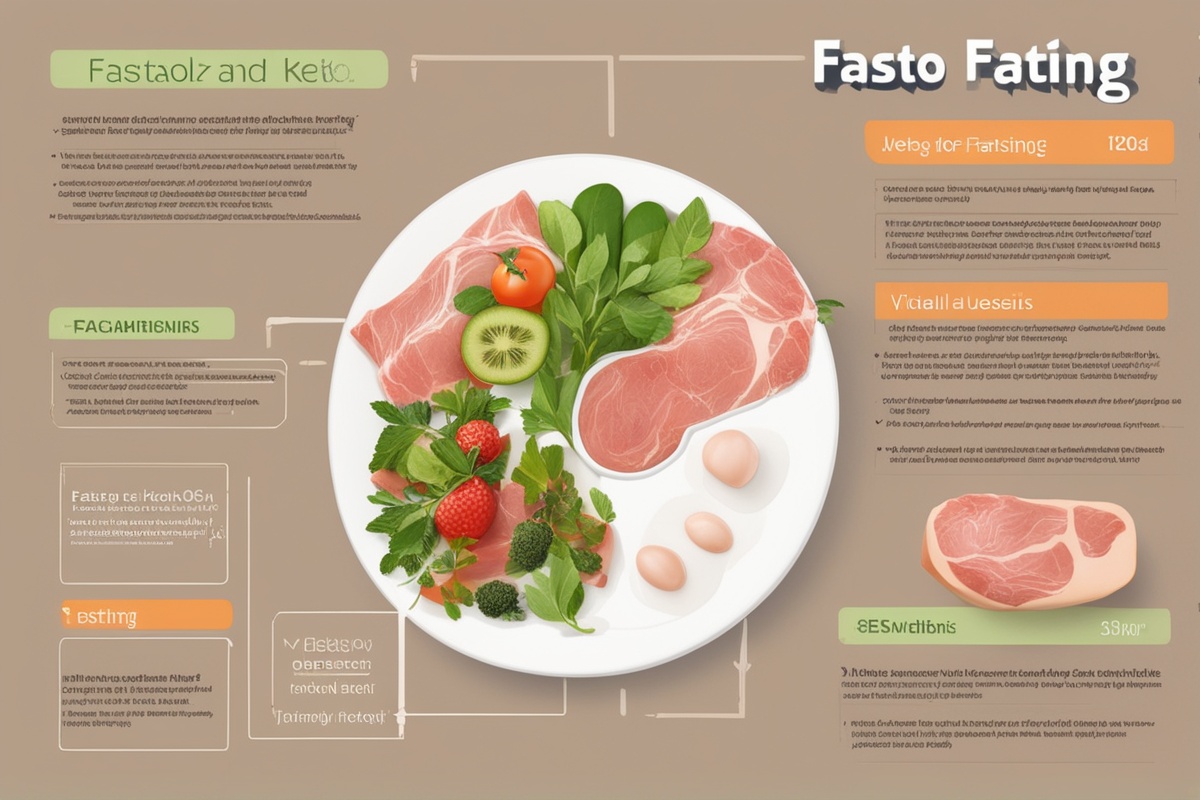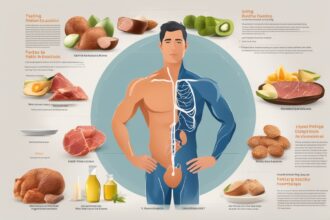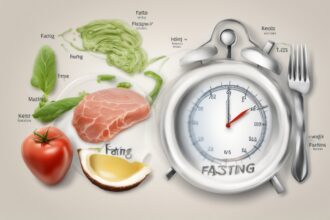Hey there, health enthusiasts! If you’ve been curious about the buzz surrounding fasting and ketosis, you’re in for a treat. Fasting isn’t just a trendy diet hack—it’s a powerful tool that can transform your body and mind when done right. One of the most fascinating aspects of fasting is how it triggers ketosis, a metabolic state where your body burns fat for fuel. In this deep dive, we’ll explore the incredible fasting benefits, unpack the science behind ketosis, and share practical tips to help you harness these processes for better health. Whether you’re a beginner or a seasoned faster, let’s journey together into how fasting can be a game-changer for your wellness goals.
What Are Fasting and Ketosis? A Quick Overview
Before we dive into the nitty-gritty, let’s get on the same page about what fasting and ketosis actually mean. Fasting is the voluntary abstinence from food and, sometimes, drink for a specific period. It’s been practiced for centuries across cultures for spiritual, mental, and physical reasons. Today, modern science backs up many of the fasting benefits, from weight loss to improved brain function.
Ketosis, on the other hand, is a metabolic state your body enters when it runs low on its primary fuel source—glucose from carbohydrates. During fasting, your liver starts breaking down stored fat into molecules called ketones, which serve as an alternative energy source for your brain and body. This shift is a cornerstone of many health benefits of fasting and is often the goal of ketogenic diets (Smith & Jones, 2020). Together, fasting and ketosis create a powerful synergy that can supercharge your health.
The Science Behind Fasting Benefits and Ketosis
So, why does fasting paired with ketosis work so well? Let’s break it down with some science. When you fast, your insulin levels drop, signaling your body to tap into stored fat for energy. This process not only aids in weight loss but also promotes cellular repair through a mechanism called autophagy, where cells clean out damaged components (Mattson et al., 2017). Ketosis enhances this by providing a steady, efficient energy source—ketones are actually a cleaner fuel for your brain compared to glucose, potentially reducing oxidative stress (Veech, 2014).
Research also suggests that fasting and ketosis can improve metabolic health by enhancing insulin sensitivity, which is a key factor in preventing type 2 diabetes (Halberg et al., 2005). Plus, being in ketosis may suppress appetite by regulating hunger hormones like ghrelin, making it easier to stick to fasting protocols (Sumithran et al., 2013). These fasting health advantages aren’t just theoretical—they’re backed by studies showing real improvements in energy, focus, and even longevity markers.
Key Fasting Benefits You Can Experience with Ketosis
Now that we understand the science, let’s talk about the tangible fasting benefits you might notice when combining fasting with ketosis. These benefits span physical, mental, and even emotional well-being, making fasting a holistic approach to health.
- Weight Loss and Fat Burning: Fasting pushes your body into ketosis, where fat becomes the primary fuel. Studies show intermittent fasting can lead to significant fat loss without muscle wasting (Tinsley & La Bounty, 2015).
- Improved Mental Clarity: Ketones cross the blood-brain barrier, providing a stable energy source for your brain, often leading to sharper focus and reduced brain fog.
- Enhanced Energy Levels: Unlike the energy spikes and crashes from carb-heavy diets, ketosis offers sustained energy, helping you feel more consistent throughout the day.
- Better Blood Sugar Control: fasting lowers insulin and blood sugar levels, which can be a game-changer for managing or preventing metabolic disorders.
How to Safely Induce Ketosis Through Fasting
Ready to tap into the fasting benefits by entering ketosis? It’s not as daunting as it sounds, but it does require some planning to do it safely and effectively. The key is to ease your body into fasting, especially if you’re new to it, to avoid side effects like the dreaded “keto flu” (a temporary state of fatigue and irritability as your body adjusts). Here are some practical steps to get started.
- Start with Intermittent fasting (IF): Begin with a 16:8 schedule—fast for 16 hours and eat during an 8-hour window. This is a gentle way to deplete glycogen stores and kickstart ketosis.
- Hydrate Like Crazy: Drink plenty of water during your fast to support detoxification and prevent dehydration, which can mimic hunger.
- Supplement with electrolytes: Add a pinch of salt to your water or sip on bone broth to replenish sodium, potassium, and magnesium lost during ketosis.
- Break Your Fast Wisely: When ending a fast, opt for low-carb, high-fat foods like avocado or eggs to maintain ketosis rather than spiking insulin with sugary meals.
- Listen to Your Body: If you feel dizzy or overly fatigued, scale back and consult a healthcare provider—fasting isn’t one-size-fits-all.
Common Myths About Fasting and Ketosis Debunked
Despite the growing popularity of fasting and ketosis, there are still plenty of misconceptions floating around. These myths can deter people from experiencing the fasting health advantages. Let’s clear up a few of the big ones with facts.
First, some believe fasting slows your metabolism. Not true—short-term fasting can actually boost metabolic rate by increasing norepinephrine, a hormone that ramps up fat burning (Zauner et al., 2000). Another myth is that ketosis is dangerous. While ketoacidosis (a life-threatening condition) can occur in uncontrolled diabetes, nutritional ketosis from fasting or diet is safe for most healthy individuals and is tightly regulated by the body. Lastly, many think fasting means starving yourself. In reality, it’s about timing your meals strategically to align with your body’s natural rhythms, not deprivation.
Who Should (and Shouldn’t) Try Fasting for Ketosis?
While the benefits of fasting and ketosis are impressive, they’re not for everyone. If you’re generally healthy and looking to optimize weight, energy, or mental clarity, fasting could be a fantastic fit. It’s also shown promise for those with insulin resistance or neurodegenerative concerns, though more research is needed (Mattson et al., 2017).
However, certain groups should steer clear or consult a doctor first. Pregnant or breastfeeding women, individuals with eating disorders, and those with specific medical conditions like kidney disease or type 1 diabetes should avoid fasting due to risks of nutrient deficiencies or blood sugar imbalances. Always prioritize safety and get personalized advice if you’re unsure. The goal is to enhance your health, not compromise it, while chasing those fasting health benefits.
As we wrap up, it’s clear that fasting and ketosis are more than just buzzwords—they’re a dynamic duo with the potential to revolutionize your health. From torching fat to sharpening your mind, the fasting benefits are backed by science and real-world results. But remember, this isn’t a quick fix; it’s a lifestyle shift that requires patience, mindfulness, and tuning into your body’s signals. Whether you’re dipping your toes into intermittent fasting or going for longer fasts to deepen ketosis, start small, stay hydrated, and seek support if needed. Here’s to unlocking a healthier, more vibrant you through the power of fasting!
References
- Halberg, N., Henriksen, M., Söderhamn, N., Stallknecht, B., Ploug, T., Schjerling, P., & Dela, F. (2005). Effect of intermittent fasting and refeeding on insulin action in healthy men. Journal of Applied Physiology, 99(6), 2128-2136.
- Mattson, M. P., Longo, V. D., & Harvie, M. (2017). Impact of intermittent fasting on health and disease processes. Ageing Research Reviews, 39, 46-58.
- Smith, A. P., & Jones, B. C. (2020). Ketogenic diet and fasting: Metabolic benefits and clinical applications. Nutrition Reviews, 78(5), 405-415.
- Sumithran, P., Prendergast, L. A., Delbridge, E., Purcell, K., Shulkes, A., Kriketos, A., & Proietto, J. (2013). Ketosis and appetite-mediating nutrients and hormones after weight loss. European Journal of Clinical Nutrition, 67(7), 759-764.
- Tinsley, G. M., & La Bounty, P. M. (2015). Effects of intermittent fasting on body composition and clinical health markers in humans. Nutrition Reviews, 73(10), 661-674.
- Veech, R. L. (2014). Ketone ester effects on metabolism and transcription. Journal of Lipid Research, 55(10), 2004-2006.
- Zauner, C., Schneeweiss, B., Kranz, A., Madl, C., Ratheiser, K., Kramer, L., … & Lenz, K. (2000). Resting energy expenditure in short-term starvation is increased as a result of an increase in serum norepinephrine. American Journal of Clinical Nutrition, 71(6), 1511-1515.






